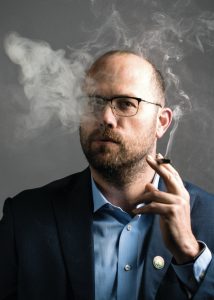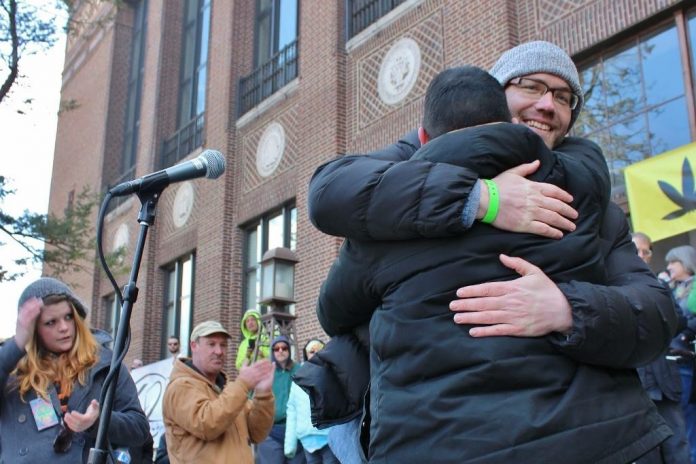Given President Biden’s October 6, 2022 address vowing to pardon prisoners incarcerated at the federal level for simple marijuana possession, many have been hopeful friends and family would be released from federal incarceration due to cannabis prohibition, and the war on drugs.
The problem is, not one person is in federal prison for “simple possession” of marijuana, as Biden narrowly defines the terms for release. According to an article published in the BBC, no one is serving time in federal prison for the crime of simple possession.
Support for cannabis reform is overwhelmingly popular as reflected in a 2021 Gallup poll showing 68% of people favored, not just pardons, but full federal legalization. The political enthusiasm for cannabis reform was further reflected when President Trump pardoned 12 prisoners on his final day in office, some of whom were inmates for life due to the three strikes rule, a 1994 crime bill written by Biden himself when he was a congressman. The bill was aimed at stiffening drug crimes and led to the mass incarceration of minorities.
President Biden made his announcement weeks before the congressional November midterm elections.
Biden’s overture towards cannabis reform falls far short of his campaign promises to decriminalize marijuana and leaves nonviolent federal inmates hoping for redemption from the war on drugs to languish in prison.
So, while redemption continues to elude federal prisoners for now, there is a company fighting for prisoners who find themselves behind bars due to cannabis prohibition.

The story of Redemption Cannabis, a cannabis company founded by Ryan Basore, whose products can be found in provisioning centers throughout the greater Grand Rapids area, as well as in provisioning centers all over the state of Michigan, is that company.
The path to forming Redemption Cannabis is a story defined by one man’s inexorable struggle through life changing pain, and loss, and utterly devastating ruination, tempered only by the triumph of indomitable will, persistence in the face of seemingly insurmountable adversity, including years of imprisonment, all culminating in the sweet taste of long awaited and well deserved redemption.
Mark Passerini, the Chair for the Redemption Foundation, also co-founded Om of Medicine, the longest continuously operating cannabis retailer east of the Mississippi River, in Ann Arbor, Michigan in 2010. Passerini is also the founder of Ann Arbor Medical Cannabis Guild of which he served as president for its first two years, as well as serving as the Vice Chair of the Michigan Cannabis Industry Association and is a longtime business associate and friend of Ryan Basore, having known Basore for 20+ years.
According to Passerini, Basore enjoyed years of success in the insurance industry and describes him as a “soft-spoken, ethical, universally well-liked and respected businessman.”
Passerini said Basore leveraged his business acumen, background and education to become one of Lansing, Michigan’s first entrepreneurs to open a medical marijuana dispensary, Capital City Caregivers, in 2010.
Through serving the community in the operation of his newly formed provisioning center, Basore witnessed cannabis dramatically improving the lives of patients suffering from a variety of ailments including addiction to pain killers, while significantly helping patients afflicted with uncontrollable, debilitating seizures. He watched in awe as cannabis miraculously transformed the lives of patients suffering from a host of sicknesses. Not only did Basore witness the utility of cannabis in helping people discontinue prescription pain medication, but he can relate from personal experience.

Having worked on a farm from an early age, Basore fell off a tractor at age 11. His hips would “come out of place every once in a while” leading to debilitating pain. He was prescribed Flexeril, a muscle relaxant used for acute musculoskeletal pain, but said the medication “turned me into a zombie.” When he got a little older, Basore tried cannabis and found it allowed him to function while relieving pain. Basore would go on to graduate at the top of his high school class, become a star athlete and eventually play basketball for Olivet while in college.
Passerini, while acting as co-founder for Om of Medicine similarly relates how he watched “hundreds of patients overcome opiate addiction though the substitution of cannabis for pain management” while operating Om of Medicine.
The transformative, palliative effects brought about by cannabis use in patients convinced Basore and Passerini that helping people through access to cannabis would be their life’s work and purpose, while honoring them with the opportunity to “do well, while also doing good.”
After the passage of the Michigan Medical Marijuana Act in 2008, Basore would begin a grow operation in a warehouse near Okemos High School, with full knowledge of local officials. Determined to do things properly, contracts were drawn up, limited liability companies formed and a federal tax ID filed.
Aware of the long-standing demonization and stigma surrounding cannabis prohibition, Basore went about the process of rigorously following the guidelines outlined in the Michigan Medical Marijuana Act. Given that he dutifully made every effort to operate legally and even notified local officials of his grow operation to insure he was operating within the bounds of the law, Basore fully believed his operation was in “full and substantial compliance with both state and local law,” he said.
Even so, he was targeted for a federal investigation and his operation was raided by the DEA, State Police, and National Guard, his business dismantled and destroyed, his life turned into a hellscape. He was indicted on 11 federal charges.
A lengthy, expensive, and tumultuous court battle ensued, leaving him financially ruined andemotionallyexhausted. Withhisbusiness in ashes, Basore ultimately plead to two charges involving conspiracy to manufacture marijuana (rather risk going to trial and a 10-year prison sentence) and was sentenced to four years in federal prison in 2012.
Cannabis was and still remains illegal at the federal level despite 21 states around the country having medical marijuana laws on the books. Nonetheless, the DEA’s position on marijuana has not changed.
“A lot of the passion I have regarding marijuana, the passion I have against medical marijuana, is not as a DEA agent as much as it is a concerned parent,” Rich Isaacson,
a spokesman for the U.S. Drug Enforcement Administration’s Detroit office, told the Lansing City Pulse (“The Okemos 7,” July 11, 2013). Isaacson said the investigation was a partnership of the DEA, the Internal Revenue Service and the Bureau of Alcohol, Tobacco and Firearms, as well as local law enforcement agencies. “Some probably participated to larger degrees than others,” he said.
“Authorities seized grow equipment in addition to the plants,” Isaacson said. “I’m a man who’s interested in drug prevention. When you have these medical marijuana laws and you have an increased availability of marijuana in our community, you have a lessened perception of risk by young people, and that leads directly to increased use of marijuana among people.”

Isaacson went on to say: “Here in Michigan, the people who have their legitimate medical marijuana cards, if they’re following the law, they don’t have to be concerned about the DEA using its resources to go after them. We target large-scale manufacturers.” He argues that Basore was “was not following the letter of state law” due to the nature of the operation. “If it had been, the DEA would not have devoted its resources (to stopping it). … People starting a business and operating a business under the hopes that the federal government may not enforce existing law seems like an interesting way to go about starting a business.”
Bob Baldori, one of Basore’s attorneys, accused the federal government of “selective prosecution” by going after Basore who was bending over backwards to follow the law, and not others who profit off the marijuana industry.
“Why these guys? It’s a mystery,” Baldori said. “It’s a fucking outrage. Every time I think about it, it makes me sick. This is going to bring nothing but disrespect for the courts, the law, and the police. I haven’t run into anybody in this community who isn’t just shocked by it. It’s having the exact opposite effect. I want to live in a community where people do respect the police and are not worried about secret police.”
While many would understandably sour on an industry that subjected them to heartbreaking loss on a scale and magnitude of most of us would have a hard time conceiving, and after being put through the humiliation of years of federal prison, an indignity most of us would find impossible to fully relate, Basore accomplished
the unlikely by refusing to allow himself to become broken and embittered. Instead, he determined to channel the trauma into strengthening his resolve. Basore made the difficult choice to commit to doing all he could to see others not be subjected to the same life altering treatment he was forced to withstand.
While in prison Basore was given a front row seat to the hardship imposed by a system bent on incarcerating people who harm no one, and witnessed firsthand, in graphic relief, the devastation left in the wake of people, like himself, who have been locked up for years over nothing more than the consensual crime of supplying cannabis, while doing all they can to follow the law.
After serving three years of his four-year sentence in FCI Morgantown, WV, Basore refused to give up or allow his spirit to be broken. Instead, when things looked bleakest, he made it his mission to not only supply the public with the “most affordable, highest quality cannabis products” he could produce as allowed under new legislation, but also resolved to help those who have been most impacted by the injustices of cannabis prohibition.
Following the passage of Proposal One in 2018 to legalize cannabis, Basore worked tirelessly as a cannabis reformer and political advocate beginning with the establishment and growth of the “Michigan Cannabis Industry Association,” a leading voice for legal cannabis businesses. Its mission is to “advocate for responsible and successful medical and adult cannabis use by promoting sensible laws, regulations and industry best practices among members”. After growing the MCIA to over 200 members, Basore went on to pursue further ventures in the Cannabis space.

With the help and support of a $50,000 social equity grant from Gage Cannabis Co, located at 3075 Peregrine Dr NE, Grand Rapids, MI, Redemption Cannabis was made possible. What many hope for, but few rarely receive, was finally granted: a second chance. Basore became the first recipient of Gage Cannabis Co’s social equity initiative, which extended a total of $950,000 to cannabis entrepreneurs who have been negatively impacted by cannabis prohibition and enforcement. Gage Cannabis Co initiative has made it possible for “Cannapreneurs” to pursue exciting opportunities in the cannabis industry in Michigan.
Basore could have made his only aim to be the growth of a profitable business, but he was not content in simply growing Redemption Cannabis through supplying an affordable, high-quality product. Instead, he put his dollars where his heart is in forming a non-profit organization entitled, “The Redemption Foundation,” the only singular cannabis company in Michigan to donate 10% of proceeds to helping those harmed by the injustices of cannabis prohibition and the War on Drugs.
Basore is also president of “The Great Lakes Expungement Network,” a nonprofit organization dedicated to helping people take advantage of the “clean slate law,” which allows people to have cannabis offenses stricken from their records and includes job skills training programs. Countless Michiganders have benefited from GLEN in gaining access to housing, jobs, and opportunities they might not otherwise have had, if not for this organization. With Basore’s vision, Redemption Cannabis has become not just a brand, but a movement.
“In a very real way, when people choose Redemption Cannabis products, they are helping countless Michiganders gain access to housing, better jobs and opportunities,” said Basore “A vote cast with your dollar in support of a the Redemption Brand is a dollar spent to right the injustices brought about by cannabis prohibition; and yes, supporting a company built on ethics while purchasing some of the most affordable, highest quality cannabis products on the market.”
The story of Redemption Cannabis and its founder, Ryan Basore is an inspiring one, a testament to the power of a positive attitude, especially when a darkness, as German poet Ranier Rilke puts it, “like light and cloud shadows passes over your hands and over all you do,” proof that when we follow our heart, endeavor to do what is good, what is right, what is just, and strive to help others, when we ourselves are met with obstacles that may seem insurmountable, and all seems lost, that maybe we too can prevail, and in the end find, well, redemption.
Redemption brand cannabis can be found in provisioning centers throughout the Grand Rapids area including Gage Cannabis Co, Pharmhouse Wellness, Olswell Cannabis, or Ascend Wellness.
Editor’s note: The March/April 2023 edition of Grand Rapids Magazine will feature a guide with descriptions of some of these dispensaries for people who cannabis curious.
Stay tuned…








Facebook Comments